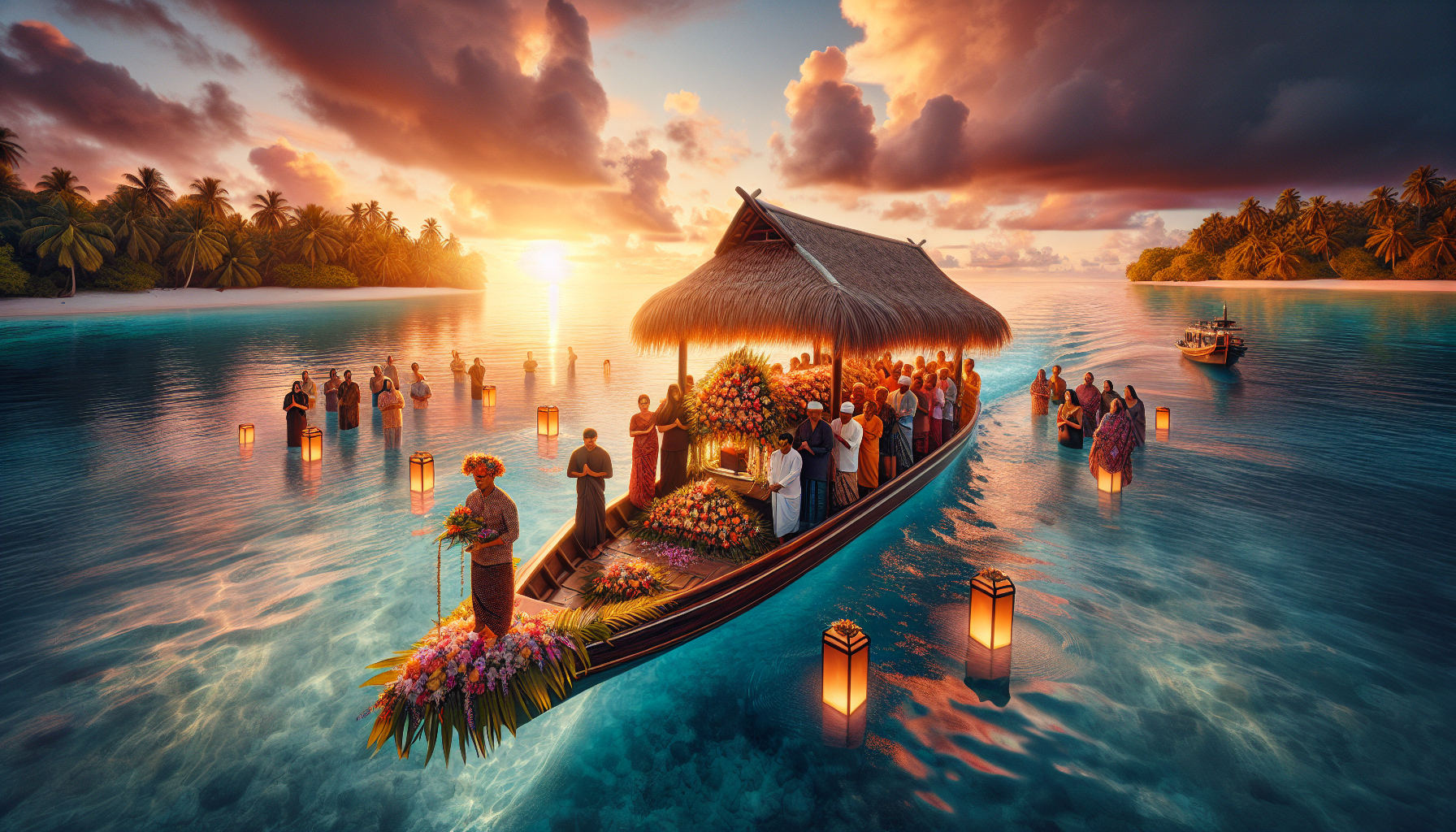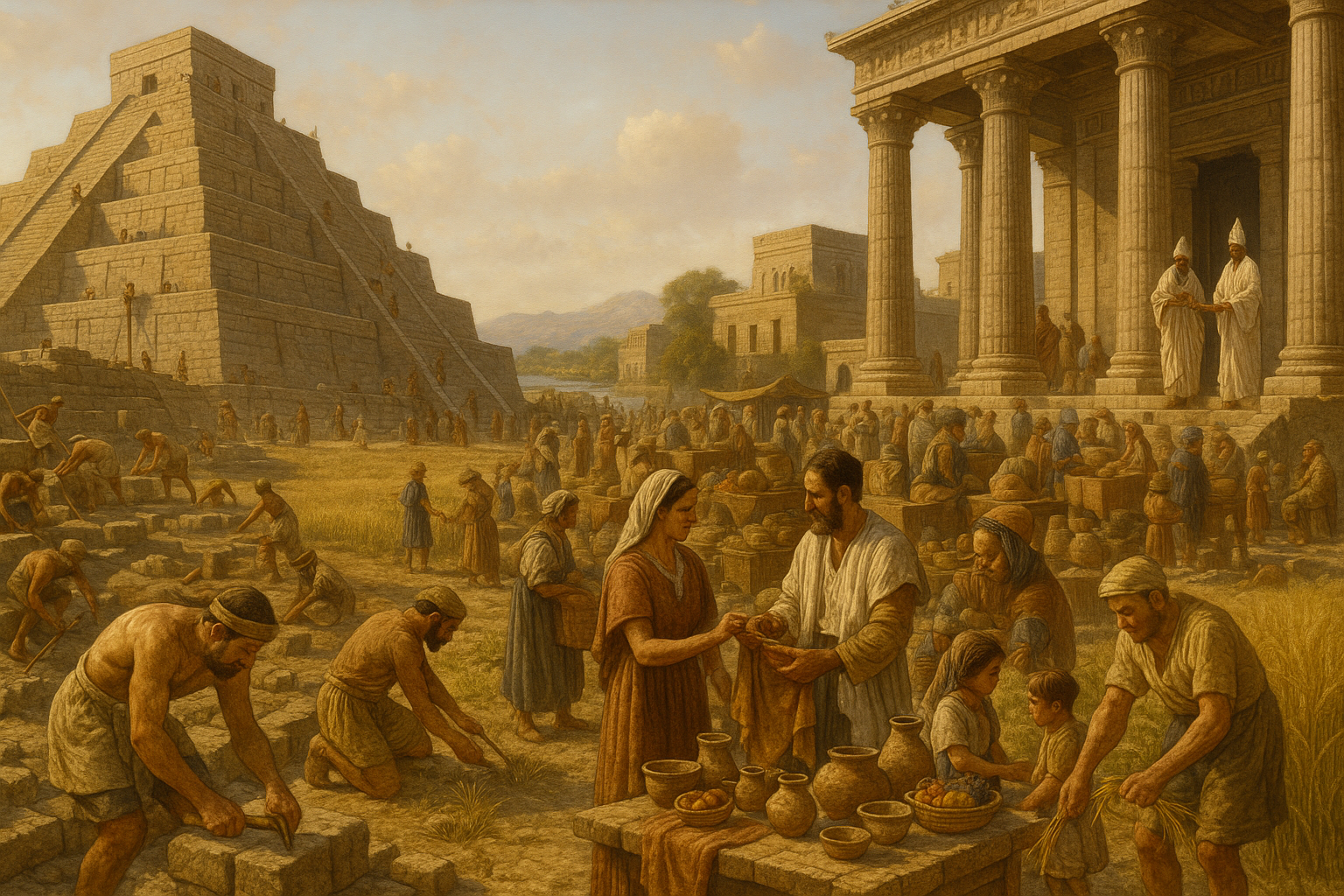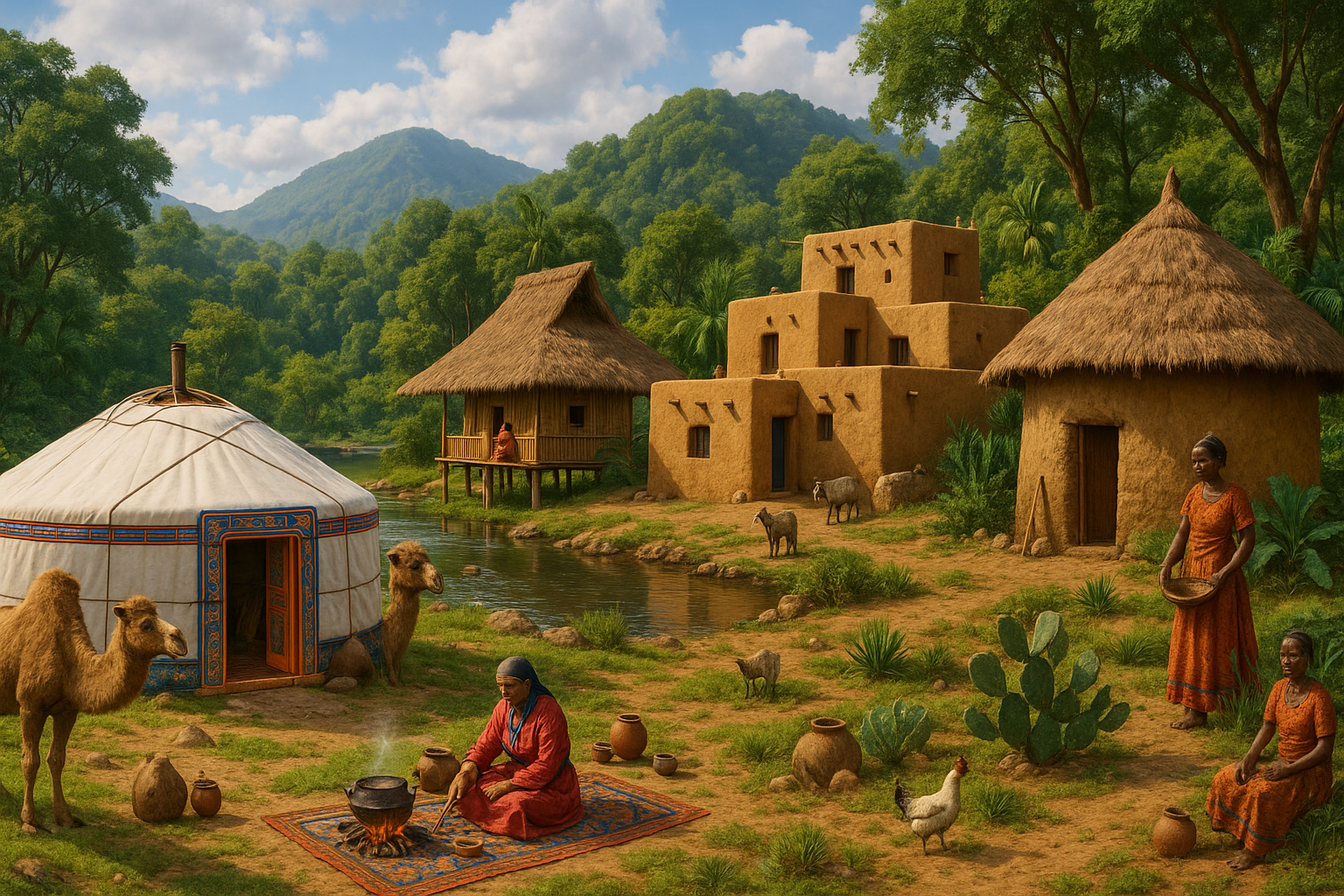The vast expanse of the Indian Ocean has long been a cradle of life, culture, and tradition. Among its islands, a unique and poignant set of customs stands out — maritime funeral ceremonies. These rituals, rooted in the traditions of diverse island communities, offer a fascinating glimpse into how life and death are intertwined with the sea.
Maritime funeral ceremonies are more than just farewells; they are cultural expressions that honor the deceased and reflect a deep connection to the ocean. From the serene coasts of Madagascar to the vibrant shores of the Maldives, these rituals vary significantly, each with its unique symbolism and practices. The interplay of indigenous beliefs and external influences has crafted ceremonies that are as diverse as the islands themselves.
Exploring these ceremonies uncovers stories of heritage and continuity, where ancient practices meet the challenges and transformations of modern times. Some communities utilize biodegradable materials for sea burials, while others incorporate music and dance, creating a celebratory atmosphere amidst the somber occasion. The ocean, as a final resting place, symbolizes a return to nature and the continuity of the life cycle.
As we delve into the world of maritime funeral ceremonies in the Indian Ocean islands, it becomes clear that these rituals are not only a means of saying goodbye but also a testament to the enduring relationship between humans and the sea. This exploration invites a deeper understanding of cultural diversity and the universal quest for meaning in life and death. 🌊
The Rich Tapestry of Maritime Funeral Traditions
The Indian Ocean islands, each with their unique cultural tapestries, offer a fascinating insight into the diverse maritime funeral traditions practiced across their shores. These ceremonies are not just about bidding farewell to the departed but are a profound reflection of the communities’ relationship with the sea, which is both a giver of life and a passage to the afterlife. From the haunting chants in Madagascar to the vibrant rituals in the Maldives, each island has developed its own distinctive practices that honor their dead in ways that are deeply connected to their maritime lifestyle.
In Madagascar, for example, the practice of “famadihana” or turning of the bones, although primarily a land-based ritual, often involves elements that are deeply intertwined with the sea. During this ceremony, the deceased are exhumed and wrapped in new shrouds amidst lively music and dance, symbolizing the cyclical nature of life and death. The ocean, representing both continuity and change, plays a subtle yet significant role in this celebration of life.
Similarly, in the Maldives, the tradition of setting small boats adrift at sea to honor the deceased is a poignant reminder of their dependency on and respect for the ocean. These boats, often crafted with intricate designs, serve as a vessel carrying the soul towards the horizon, symbolizing the journey to the afterlife. Such ceremonies highlight the Maldivian belief in the ocean as a powerful intermediary between the realms of the living and the dead.
Madagascar: The Melancholic Chants of the Sea
The Famadihana and Its Connection to the Ocean
Madagascar, the fourth largest island in the world, is home to a myriad of ethnic groups, each with their own unique traditions and beliefs. The “famadihana” is a striking funeral tradition observed by the Malagasy people, known for its elaborate rituals and deep spiritual significance. While primarily a terrestrial ceremony, its ties to the ocean are symbolic and profound.
During the “famadihana,” families exhume the bodies of their ancestors, rewrapping them in new shrouds and celebrating their lives with music, dance, and feasting. Although the ceremony takes place on land, the presence of the ocean is felt through the rhythmic chants that mimic the ebb and flow of the sea. These chants are believed to guide the spirits of the ancestors, providing them with a sense of direction in their journey to the afterlife.
The ocean is seen as a vast, eternal entity that connects the physical and spiritual worlds. In this way, it serves as a metaphorical bridge for the souls of the departed. The inclusion of maritime elements in the “famadihana” highlights the islanders’ deep-rooted connection to the sea, which is regarded as both a source of sustenance and a pathway to the spiritual realm.
Taboos and Reverence: The Ocean as a Sacred Space
The relationship between the Malagasy people and the ocean is one of reverence and respect. Various taboos, or “fady,” are observed to ensure the harmony between humans and the sea. These taboos often dictate behaviors related to fishing, sailing, and maritime activities, underscoring the sacredness of the ocean as a final resting place for the souls of the deceased.
In many coastal communities, it is believed that the spirits of the ancestors reside in the depths of the ocean, watching over their descendants and guiding them through life’s challenges. As such, the sea is not only a place of mourning but also one of protection and guidance. This profound respect for the ocean is reflected in the careful observance of rituals and taboos, which serve to maintain the delicate balance between the living and the dead.
The Maldives: Boats Adrift on Eternal Waters
Traditional Maritime Funeral Practices
In the Maldives, an archipelago known for its breathtaking atolls and turquoise waters, the ocean plays a central role in the lives of its inhabitants. As such, maritime funeral practices are deeply ingrained in the culture of the Maldivian people. One of the most poignant of these traditions is the setting adrift of small boats, which serve as symbolic vessels for the souls of the departed.
These boats, often intricately crafted and decorated, are released into the sea during a solemn ceremony. The act of setting the boat adrift is accompanied by prayers and songs, invoking the protection of the ocean and ensuring a safe passage for the soul to the afterlife. This ritual underscores the belief in the ocean as a powerful intermediary between the earthly and spiritual realms.
The Role of Community in Maritime Funerals
Community involvement is an integral aspect of maritime funerals in the Maldives. The preparation and execution of the ceremonies are collective efforts, with families and neighbors coming together to honor the deceased. This communal participation reinforces social bonds and ensures the continuity of cultural traditions.
- Collective crafting of boats for the ceremony
- Community prayers and songs during the ritual
- Shared feasts and gatherings to honor the deceased
The Seychelles: A Blend of African, European, and Asian Influences
Hybrid Funeral Traditions and Oceanic Symbolism
The Seychelles, an archipelago consisting of 115 islands, is a melting pot of cultural influences. The funeral traditions here reflect a unique blend of African, European, and Asian elements, creating a tapestry of rituals that are both diverse and deeply symbolic.
Oceanic symbolism is prevalent in Seychellois funeral practices, with the sea often depicted as a pathway to the afterlife. Ceremonies may involve the casting of wreaths or flower garlands into the ocean, symbolizing the release of the soul and its journey into eternity. These offerings are accompanied by prayers and chants, invoking the blessings of the sea and ensuring the safe passage of the deceased.
The Influence of Religion on Maritime Funerals
Religion plays a significant role in shaping funeral practices in the Seychelles. The predominant religions on the islands are Christianity, Hinduism, and Islam, each contributing to the diversity of maritime funeral traditions. The influence of these religions is evident in the rituals and ceremonies that honor the deceased and celebrate their journey to the afterlife.
Christian funerals in the Seychelles often incorporate hymns and prayers that reference the ocean as a symbol of God’s eternal love and protection. In Hindu ceremonies, the sea is seen as a purifying force, cleansing the soul of the deceased and preparing it for reincarnation. Islamic funerals emphasize the importance of charity and community support, with the ocean serving as a metaphor for the boundless mercy of Allah.
| Religion | Symbolism | Funeral Practices |
|---|---|---|
| Christianity | Ocean as God’s eternal love | Hymns and prayers referencing the sea |
| Hinduism | Sea as a purifying force | Offerings and chants for reincarnation |
| Islam | Ocean as Allah’s mercy | Charity and community support |

Conclusion
In conclusion, the maritime funeral traditions of the Indian Ocean islands present a compelling reflection of the symbiotic relationship between island communities and the sea. These unique ceremonies, deeply embedded in cultural heritage, are more than mere farewells; they embody the profound respect and dependence these communities have on the ocean. The hauntingly beautiful rituals of Madagascar’s “famadihana,” for example, highlight how the ocean’s symbolism weaves into terrestrial practices, guiding spirits towards the afterlife. Similarly, in the Maldives, the poignant act of setting intricately designed boats adrift underscores a cultural belief in the ocean as a conduit to the spiritual realm. Such traditions are not isolated occurrences; they are communal events, strengthening social bonds and preserving cultural identity.
In the Seychelles, a blend of African, European, and Asian influences has crafted a diverse tapestry of funeral practices, where religious beliefs further shape the role of the ocean in afterlife journeys. These islands’ rituals illustrate a vibrant amalgamation of cultural elements, showcasing the adaptability and resilience of their communities. Through maritime funeral traditions, the Indian Ocean islands celebrate a deep-seated reverence for the sea, portraying it as a timeless entity that bridges life and the hereafter. 🌊 This enduring connection with the ocean not only honors the deceased but also enriches the living cultural legacy of these island communities.
Toni Santos is a visual storyteller and experimental artisan whose work explores the strange frontiers where science meets art. Fascinated by the forgotten, the obscure, and the wonderfully absurd, Toni brings bizarre scientific experiments to life through provocative visual narratives and handcrafted creations that blur the line between curiosity and discovery.
His journey is rooted in a passion for the eccentric side of science — from electric shocks on cadavers to botany in hostile environments, from Victorian medical oddities to animal behavior gone rogue. Each project Toni undertakes sheds light on real (and sometimes questionable) scientific ventures that push the boundaries of human understanding.
With a background in visual design and hands-on craftsmanship, Toni blends artistic precision with conceptual boldness. His creations aren’t just decorative — they provoke, disturb, and invite the viewer to reconsider what counts as science, progress, or even sanity. Often inspired by true experiments — like galvanic resurrection, psychological endurance tests, or 19th-century pseudo-science rituals — Toni’s work reanimates these bizarre chapters of history with aesthetic intrigue and critical reflection.
As the creative force behind Vizovex, Toni invites you to explore a world where the strange becomes symbolic, the grotesque becomes beautiful, and every experiment tells a story worth unearthing.
His work pays tribute to:
The brilliant madness of forgotten experiments
The symbolic power of science at the edge of reason
The beauty in questioning what we think we know
Whether you’re a curious mind, a lover of scientific history, or simply drawn to the uncanny, Toni welcomes you to explore a realm where aesthetics and absurdity collide — one experiment, one mystery, one creation at a time.





